Brexit Brief Newsletter
29 March 2021

Welcome to the 29 March 2021 newsletter
NI Assembly Committees held a joint evidence session with representatives from the Trader Support Service and HMRC. The Specialised Committee on the Protocol on Ireland/ Northern Ireland met on Friday. Lord Frost has been answering questions in the House of Lords on Brexit, trade, and the Protocol. The Dunlop Review, which considers the capability of the Union, has finally been published.
TSS and HMRC give evidence to Committees
On Wednesday the Committee for Economy, Committee for Infrastructure, and Committee for Agriculture, Environment and Rural Affairs held a concurrent meeting with the Trader Support Service and Her Majesty's Revenue and Customs (HMRC) on the impact of the Protocol. The Trader Support Service (TSS) helps businesses which move goods between Great Britain and Northern Ireland. The service is free to use and completes declarations on behalf of businesses. The service went live in September 2020 and is backed by to £355 million of UK government funding. Fujitsu heads the consortium which delivers the service.
Christian Benson of Fujitsu stated that the TSS has been "built and rolled out in three months". He said they have hosted over 150 engagements so far, and held over 75 seminars which have reached around 3500 organisations. He outlined the function of the TSS: to provide education and advice via the website, but also through a contact centre to support traders to resolve issues with the process. This regards the HMRC customs process, rather than other documentation which is now also required, such as Export Health Certificates. Benson said that over 36,000 traders have registered with the service, of which 43% are based in NI, 2% in Ireland and 55% in GB. On average, Benson said they have been able to process 80% of declarations within 15 minutes.
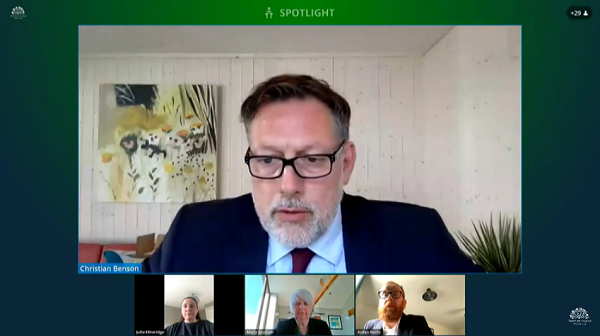
Christian Benson of Fujitsu speaking to the Committees | Source: NI Assembly
Chair of the Economy Committee Caoimhe Archibald asked about reports that TSS was not working particularly well initially and what is being done to respond to the needs of businesses. Benson said they continue to provide training for agents and are gradually improving the service. On grace periods and the potential increase in the volume of declarations, Mary Scullion of Fujitsu said that as the service is digital first, a large part of the movements are processed electronically and they think they have the resources in place to deal with an increase in volume.
Aidan Reilly of HMRC said they are looking to provide a reimbursement scheme for goods which are charged tariffs but remain in NI, where “traders will be able to make retrospective claims back to the beginning of the regime to ensure they don’t lose out from that perspective”. He said they are trying to “ensure that traders make the best choices they can to avail of the options to avoid a tariff through either the waiver scheme, the UK trader scheme, a claiming preference or using one of the customs special procedures if they apply.”
Meeting of the Specialised Committee
The seventh meeting of the Specialised Committee on the implementation of the Protocol on Ireland and Northern Ireland was held on Friday. The Specialised Committee was established in the EU-UK Withdrawal Agreement. It facilitates the implementation and application of the Protocol and makes recommendations to the Joint Committee.
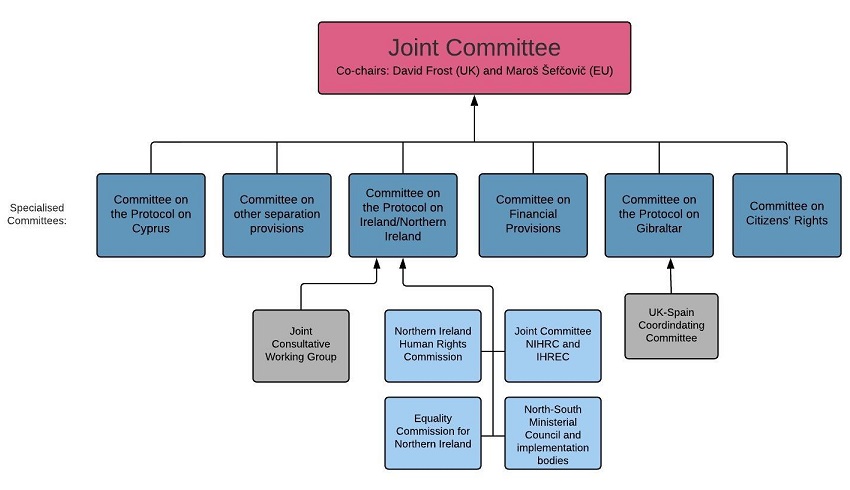
A guide to the Withdrawal Agreement governance structures
According to a UK Government statement, the meeting’s atmosphere was “constructive”. It was attended by a representative from the Northern Ireland Executive. The UK stated that “continued progress would require action from the EU as well as the UK” and set out its expectation that “establishment of an agreed work programme would help to ensure the acceptable resolution of those issues in a way that ensured minimum disruption to everyday life in Northern Ireland.”
In its statement, the European Commission recalled the legal action it initiated against the UK on 15 March and “called on the UK government to confirm that the common objective is to ensure full compliance with the Protocol”. It also reminded the UK that checks and controls would be much reduced if the UK chose to agree a comprehensive veterinary arrangement following EU SPS rules. Referring the letter sent by European Commission Vice-President Maroš Šefčovič to Lord David Frost, the EU says the UK needs to provide “a credible roadmap, with clear deliverables and milestones for the implementation of the relevant rules and requirements of the Protocol for which implementation is deficient or delayed”. The EU says it expects to receive such a roadmap in the coming days.
The parties agreed to stay in regular contact over the coming weeks and agreed to engage jointly with business groups, civil society, and other stakeholders in Northern Ireland.
Finance Ministers express concern over allocation of funding
Finance Minister Conor Murphy and his counterparts from the Welsh and Scottish governments have outlined their concerns over the UK Government’s handling of the allocation of financing to replace EU funds. In a joint statement, the Ministers say the Government has decided to “bypass democratically agreed devolution arrangements to deliver the Levelling Up and Community Renewal Funds announced at Budget 2021”. They believe replacement EU funding should be allocated by devolved governments, also pointing out that “bidding for an unidentified share of a UK pot through a competitive process provides no guarantee of success.” They ask the UK Government to commit to engaging with the devolved governments in the development of the Shared Prosperity Fund and state they are seeking a meeting with Treasury to raise their concerns.
Lord Frost on Brexit, trade, and the Protocol
Lord Frost, Minister of State at the Cabinet Office, who holds responsibility for the implementation of the Trade and Cooperation Agreement, and Withdrawal Agreement, including the Protocol, was taking questions in the House of Lords on Thursday, his first session of Oral Questions as Minister of State. He took questions on the economic and political opportunities post-Brexit, NI-GB trade, and the Protocol on Ireland/Northern Ireland.
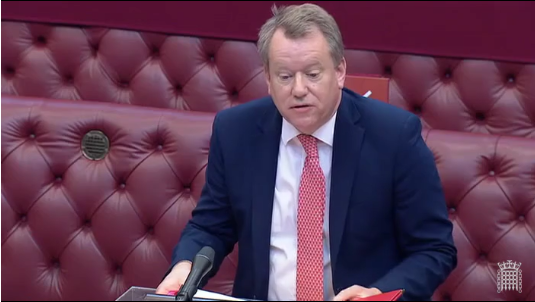
Lord Frost speaking in the House of Lords | Source: UK Parliament
He told peers that “we are considering the best way of engaging the devolved Administrations most effectively in the new [EU-UK] governance arrangements that have been set up.” On the Protocol, he reiterated the Government’s line that “the best way of dealing with the issues that are arising on trade between Great Britain and Northern Ireland is for the Northern Ireland protocol to be implemented in a pragmatic and proportionate manner…we are working with the European Union to that effect.”
Frost was asked if there is any downside to a veterinary agreement with the EU, which would mitigate many of the issues in GB-NI trade. Frost said that they had proposed an equivalence arrangement in the trade negotiations last year, saying, “unfortunately, the EU was not open to that. We continue to be open to such an equivalence arrangement, if the EU is interested in it.” He went on to say that the Government would not accept an agreement if it were based on dynamic alignment: “the downside to a Swiss-style SPS or veterinary agreement is that it would require our food and drink sector to accept not laws that were made in this country, but the laws of the European Union. As far as this Government are concerned, that is quite a considerable downside to such an agreement.”
Frost was asked by Lord Dodds (DUP) if he agreed that “we as a sovereign, independent country must ensure that the people of Northern Ireland are treated in the same way as people elsewhere in the United Kingdom”. Frost told peers that Lord Dodds is “correct to say that the future of the protocol depends on the consent of the elected representatives and the people of Northern Ireland…All sides must work to sustain it.”
Dunlop Review on Union Capability is published
On Wednesday 24 March, the UK Government published the long-awaited Dunlop Review, as well as a progress update on the joint intergovernmental relations(IGR) Review, and the first Intergovernmental Relations Quarterly Report. Chancellor of the Duchy of Lancaster and Minister for Cabinet Office Michael Gove MP made a statement to Parliament on the UK Government’s work in this regard.
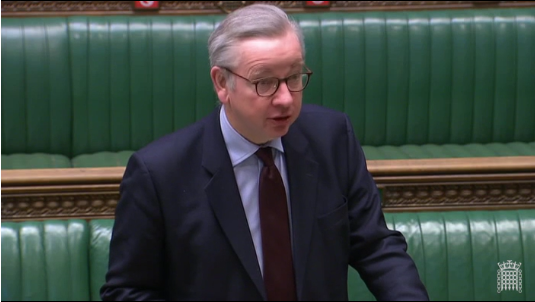
Michael Gove speaking in the Commons last week | Source: UK Parliament
The Dunlop Review was set up in 2019 by then Prime Minister Theresa May and assesses the UK Government’s current Union Capability, making recommendations to ensure “that both the Union and devolution sensitivity are a fundamental part of the structure of the UK, delivering better governance for the UK as a whole”. On intergovernmental relations (IGR), Dunlop states that the “IGR machinery is no longer fit for purpose and is in urgent need for reform”, noting that the UK’s departure from the EU has increased the need for collaborative working.
Key proposals of the Dunlop Review include to strengthen the offices of the Secretaries of State for Scotland, Wales, and Northern Ireland. Dunlop proposes that the Joint Ministerial Committee be replaced by a new UK Intergovernmental Council, which would be supported by an independent secretariat, with the Prime Minister hosting a summit at least twice a year. This would be a forum which would seek to make decisions by consensus on matters which are within devolved or shared competences, and would provide a space for “informed consultation” by the UK Government on reserved matters.
Dunlop calls for a new senior Cabinet role, ‘Secretary of State for Intergovernmental and Constitutional Affairs’, to be established, with responsibility for the constitutional integrity of the UK. He also says Ministerial Departments should give greater focus to Union issues, recommending that the Treasury sets up a fund for UK-wide projects. Departments should also increase their policy presence in the devolved regions.
Intergovernmental Relations
The Government also published a progress report on the IGR review, a joint review by the UK Government and devolved administrations “to make sure intergovernmental structures are fit for purpose”. Discussions are ongoing in some areas, and the Government intends to continue these after the elections in Scotland and Wales. Finally, the Government published the first of its quarterly reports on intergovernmental relations, in line with its transparency commitments announced in November 2020. The report includes details of UK Government departments’ engagement in intergovernmental meetings with the devolved administrations, and the engagement of the Northern Ireland Office with the Northern Ireland Executive Ministers.
Brexit in the Plenary
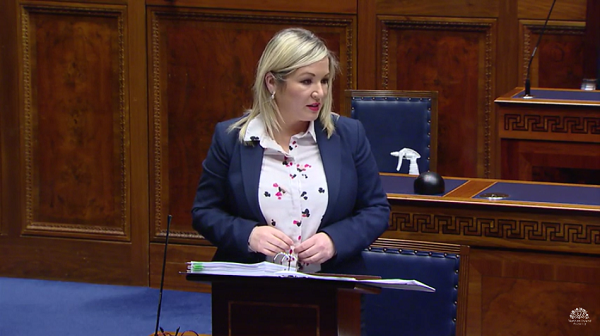
Deputy First Minister Michelle O’Neill speaking in the Assembly | Source: NI Assembly
Deputy First Minister Michelle O’Neill took questions in the plenary on Monday 22 March on behalf of the Executive Office. She outlined the discussions the Executive is involved in to address ongoing issues relating to Brexit. On the UK Government’s move to unilaterally extend the grace periods, O'Neill said, "they took unilateral action that has totally undermined the work of the Joint Committee and that risks a collision course with the European Commission where we become the collateral damage." On trade, she stated, “We have to maximise the potential that we have to access the EU market.”
Committee for the Executive Office meets with business groups
The Committee for the Executive Office held an evidence session with representatives from Ibec and CBI Northern Ireland. Angela McGowan of CBI told MLAs that their members report that "trade has been moving reasonably well and that they are increasingly getting to grips with the new administrative requirements." She said that dealing with rules of origin, customs administration, and at-risk tests hadn’t all been “plain sailing” for NI businesses but that the arrangements are much better than a “disorderly withdrawal” from the EU. Fergal O’Brien of Ibec said that while “many of the initial teething problems have been overcome”, movement of goods “has become much more complex and crucially costly”.
Other news
- The EU and UK have reached a deal on post-Brexit financial services regulation. The UK Finance Ministry said a memorandum of understanding has been agreed (but is yet to be signed), which will set the conditions for how EU and UK regulators share information. This, however, does not mean that the British financial industry will have automatic access to EU markets again.
- On 25 March, the EU announced over €28 billion for learning mobility and cross-border cooperation projects as part of the Erasmus+ programme. The Erasmus+ programme gives opportunities for study periods abroad, traineeships, apprenticeships, and staff exchanges. Over the last 30 years, more than 10 million people have taken part in the programme in the EU, as well as Iceland, Liechtenstein, North Macedonia, Norway, Serbia and Turkey. The Irish Government has said that it has made arrangements to allow students from Northern Ireland to continue to take part in the scheme, which the UK is no longer participating in.
- The Government of Wales has published a 5 point plan for supporting Welsh ferry ports. The report is intended to allow the Welsh Government to have better informed dialogue with UK and Irish Governments “who ultimately control the systems related to border processes, and enhance our lobbying for further change in support of Welsh trade and industry.” Data from February shows volumes for Welsh ferry ports had decreased by 50% compared to last year, while volumes using direct links between Ireland and the EU have increased by 242%, and volumes on the GB-NI direct routes have also increased by 5%.
- The DCU Brexit Institute has published an article on human rights and equality provisions under the Ireland/Northern Ireland Protocol. Article 2.1 of the Protocol provides that there shall be “no diminution of rights, safeguards or equality of opportunity”. The authors point out that these provisions are often overlooked but they are important in the context of Northern Ireland.
Catch up with the Committees
- Monday 22 March, 2 pm – Plenary - Question Time: The Executive Office
- Wednesday 24 March, 10.05 am – Concurrent meeting - Committee for the Economy, Committee for Infrastructure and Committee for Agriculture, Environment and Rural Affairs - Briefing from The Trader Support Service (TSS) & HMRC, Impact of the Northern Ireland Protocol
- Wednesday 24 March, 2.55 pm - Committee for Finance - Withdrawal Agreement Structures - Oral Briefing from NI Assembly EU Affairs Manager
- Wednesday 24 March, 3.30 pm - Committee for The Executive Office - UK Exit from EU - Post-Brexit Transition - Oral Evidence Session with Business Organisations
- Thursday 25 March, 11.00 am – Committee for Agriculture, Environment and Rural Affairs - Written Briefings from DAERA on EU Transition Update, and EU Exit legislation
This Week at the Assembly
The Assembly is in recess for the next two weeks.



